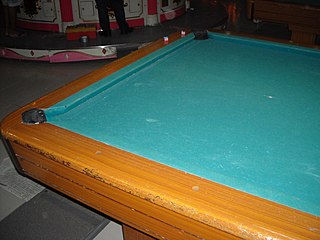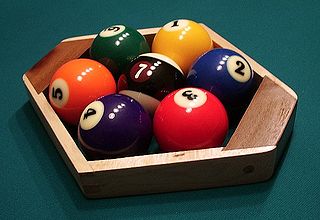
Cue sports are a wide variety of games of skill played with a cue, which is used to strike billiard balls and thereby cause them to move around a cloth-covered table bounded by elastic bumpers known as cushions. Cue sports are also collectively referred to as billiards, though this term has more specific connotations in some varieties of English.

Eight-ball is a discipline of pool played on a billiard table with six pockets, cue sticks, and sixteen billiard balls. The object balls include seven solid-colored balls numbered 1 through 7, seven striped balls numbered 9 through 15, and the black 8 ball. After the balls are scattered with a break shot, a player is assigned either the group of solid or striped balls once they have legally pocketed a ball from that group. The object of the game is to legally pocket the 8-ball in a "called" pocket, which can only be done after all of the balls from a player's assigned group have been cleared from the table.

Nine-ball is a discipline of the cue sport pool. The game's origins are traceable to the 1920s in the United States. It is played on a rectangular billiard table with pockets at each of the four corners and in the middle of each long side. Using a cue stick, players must strike the white cue ball to pocket nine colored billiard balls, hitting them in ascending numerical order. An individual game is won by the player pocketing the 9 ball. Matches are usually played as a race to a set number of racks, with the player who reaches the set number winning the match.

English billiards, called simply billiards in the United Kingdom and in many former British colonies, is a cue sport that combines the aspects of carom billiards and pool. Two cue balls and a red object ball are used. Each player or team uses a different cue ball. It is played on a billiards table with the same dimensions as one used for snooker and points are scored for cannons and pocketing the balls.

Efren Manalang Reyes, popularly known by the nicknames "Bata" and "the Magician", is a Filipino professional pool player, who is widely regarded as the greatest pool player of all time, and especially famed for his skill at the challenging one-pocket discipline. In 2003, he was inducted into the Billiard Congress of America's Hall of Fame.

Straight pool, which is also called 14.1 continuous and 14.1 rack, is a cue sport in which two competing players attempt to pocket as many object balls as possible without playing a foul. The game was the primary version of pool played in professional competition until it was superseded by faster-playing games like nine-ball and eight-ball in the 1980s.

One-pocket is a pool game. Only one pocket for each player is used in this game, unlike other games played on a pool table where any pocket can be used to score object balls. The object of the game is to score points. A point is made when a player pockets any object ball into their designated pocket. The winner is the first to score an agreed-upon number of points.
Scratch or scratching may refer to:

Russian pyramid, also known as Russian billiards, is a form of billiards played on a large billiard table with narrow pockets. It is played across Russia and several former Soviet/Eastern Bloc countries. In the West, the game is known as pyramid billiards, or simply pyramid.

A billiard table or billiards table is a bounded table on which cue sports are played. In the modern era, all billiards tables provide a flat surface usually made of quarried slate, that is covered with cloth, and surrounded by vulcanized rubber cushions, with the whole thing elevated above the floor. More specific terms are used for specific sports, such as snooker table and pool table, and different-sized billiard balls are used on these table types. An obsolete term is billiard board, used in the 16th and 17th centuries.

Pool is a series of cue sports played on a billiard table. The table has six pockets along the rails, into which balls are shot. Of the many different pool games, the most popular include: eight-ball, blackball, nine-ball, ten-ball, seven-ball, straight pool, one-pocket, and bank pool. Eight-ball is the most frequently played discipline of pool, and it is often thought of as synonymous with "pool".
Blackball, black-ball, black ball, blackballed, or blackballing may refer to:
Bank pool is a pool game that has as its most fundamental requirement that all scoring shots in the game must be made by banking a called ball off a cushion and into a called pocket.

Ten-ball is a rotation pool game similar to nine-ball, but using ten balls instead of nine, and with the 10 ball instead of the 9 as the "money ball".
The following is a glossary of traditional English-language terms used in the three overarching cue sports disciplines: carom billiards referring to the various carom games played on a billiard table without pockets; pool, which denotes a host of games played on a table with six pockets; and snooker, played on a large pocket table, and which has a sport culture unto itself distinct from pool. There are also games such as English billiards that include aspects of multiple disciplines.
A pocket is a bag- or envelope-like receptacle, most commonly in clothing.
Billiard or billiards may refer to:

Seven-ball is a rotation pool game with rules similar to nine-ball, though it differs in two key ways: the game uses only seven object balls as implied by its name, and play is restricted to particular pockets of the table. William D. Clayton is credited with the game's invention in the early 1980s.
Seven-ball, sevenball, 7 ball, or 7-ball may refer to:
Pocket Billiards are a Belfast-based 9-Piece Ska / Punk / Rock band who originally formed in 2001. The band fuse ska, reggae and dub with punk rock and heavy riffs, creating an energetic and powerful sound.











